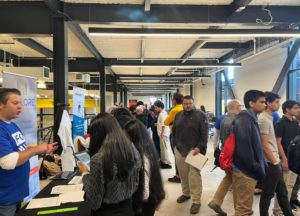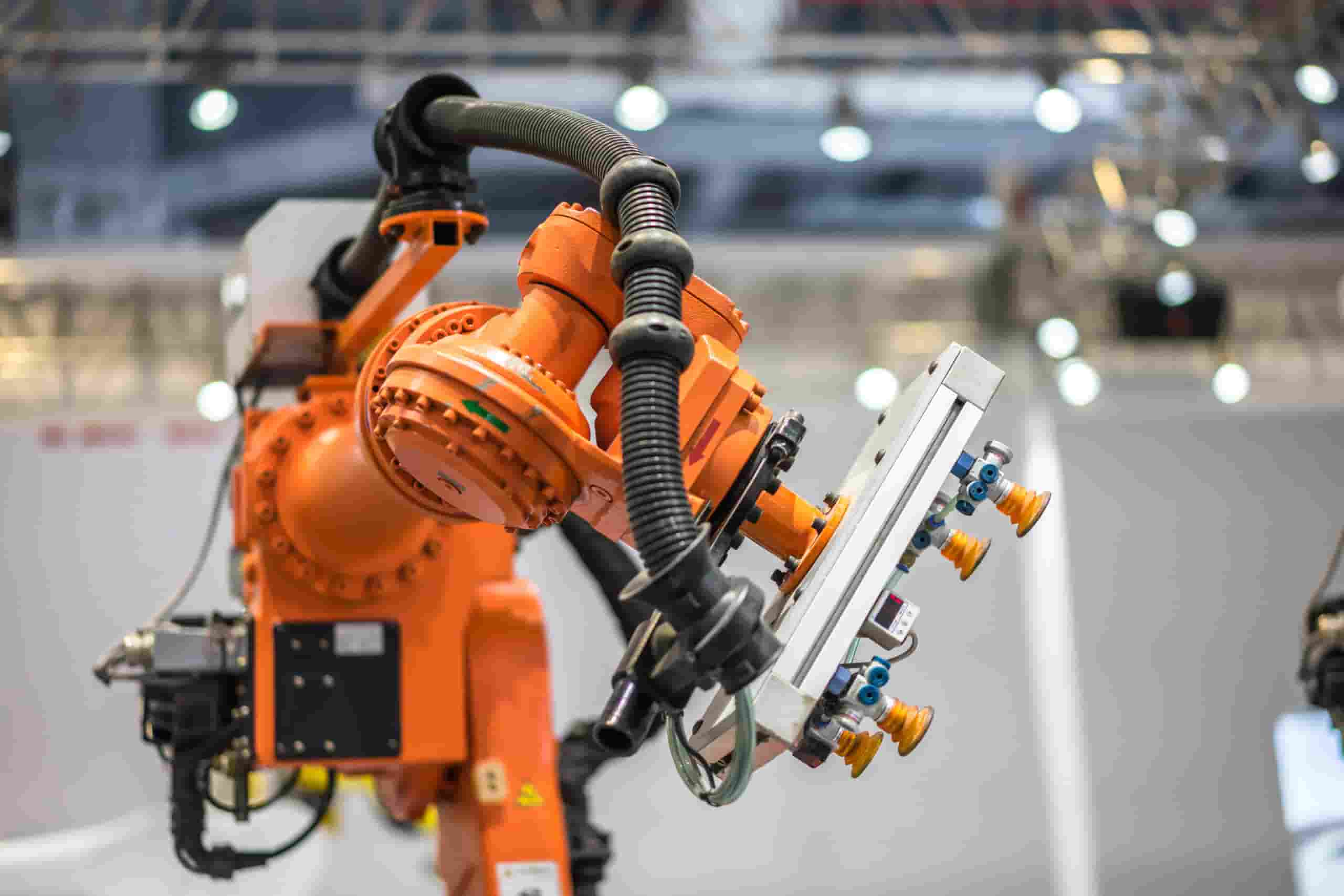
For this month’s Five Questions feature, we talked to Matt Minner, Director, Technical Services at ARM Member Catalyst Connection! Catalyst Connection, one of our neighbors at our Pittsburgh facility, is a Manufacturing Extension Partnership (MEP) serving the Southwestern Pennsylvania region.
The ARM Institute collaborates closely with Catalyst Connection. A newer collaboration between our organizations is our complementary work on the Southwestern Pennsylvania region’s Build Back Better Regional Challenge Grant. The ARM Institute’s Robotics Manufacturing Hub piece of the grant helps small and medium sized manufacturers in the region evaluate their operations, understand where robotics can address their areas of need, and prototype robotics solutions at no cost. These manufacturers can then work through Catalyst Connection’s Build Back Better Regional Challenge project called Digital Bridge to offset their costs for full implementation.
Learn more about Matt Minner, his background, what’s unique about the manufacturing landscape in Southwestern Pennsylvania, the issues regional manufacturers are facing, and Catalyst Connection’s Digital Bridge program below!
1. We like to start our interviews by exploring how our members got started in manufacturing. Can you tell us more about your background and how you became interested in manufacturing?

Ever since I was very young, I have always had an interest in industry and heavy equipment. I went to Virginia Tech (GO HOKIES!!) for my Mechanical Engineering degree and also completed my MBA. Before joining Catalyst Connection in 2017, between multiple college internships and then after college, I spent 15 years in the heavy equipment and mining industry with Caterpillar, primarily in field technical support roles. We had the opportunity to live in Santiago, Chile for four years, then relocated to Denver, Colorado for five years. All through, I always enjoyed my time in the manufacturing plants and was fascinated by the processes and tools used through every step of the manufacturing process. When we relocated to Pittsburgh, I was fortunate enough to come across an opportunity with Catalyst Connection and everything fell into place! It has been an amazing opportunity to learn about manufacturing technology, especially robotics, and see the heart of American manufacturing first-hand, the small and medium manufacturer!
2. Can you describe the manufacturing landscape in Southwestern Pennsylvania?
The manufacturing landscape in SWPA is incredibly diverse. The more than 2,700 manufacturers in the region cover sectors you would expect around Pittsburgh, like metal processing, machining, and heavy fabrication, but also some you may not expect, such as printed circuit board manufacturing, medical devices, and food production. Within the various manufacturing sectors represented, a large portion of the manufacturers are contract manufacturers, meaning that they primarily contract out their manufacturing capabilities and services to other companies who have chosen to outsource some or all of their manufacturing needs. They are largely high mix/low volume manufacturers, meaning that they make a LOT of different things, but not very many of any one item. This makes flexibility of their manufacturing systems (such as robotics and automation!) a top priority. This also means that the products they produce can end up in a wide range of end use sectors – one company could have products go into many different industries such as space, defense, energy, consumer products, medical device or many others.
Within the US, over 98% of manufacturers across the country are Small and Medium Manufacturers (less than 500 employees at a location) and our region is no exception. Our typical client at Catalyst Connection has between 10 and 150 employees. There are large manufacturers that are household names in the region like Alcoa, US Steel, Bayer, Philips, and MSA, but it’s the companies you likely haven’t heard of that make up the 98%. Companies like Penna Flame, JV Manufacturing, Heartland Fabrication, TSI Touch, and Acuity Finishing. Next time you pass through a business park or pass by companies that appear to be a manufacturer, take a closer look at them online and see what they do. It just might surprise you!
3. What are some common problems that manufacturers in Southwestern Pennsylvania are facing?
Workforce, supply chain, and economic uncertainty are big challenges facing SWPA manufacturers. I recently visited with a couple manufacturers from different sectors who both echoed declines in orders and slower operations as a challenge. Despite this current challenge, they both saw it as an opportunity to improve their operations and invest in their business for future growth. Workforce is the most critical challenge that manufacturers across the country and in SWPA alike are facing. Although gains are being made to show the vast opportunities that careers in manufacturing present, it still faces an outdated perception of a dull, dirty, and dangerous occupation. As such, there is a constant effort to engage with the future workforce and leverage technology and process improvement to produce more and grow with the existing workforce.
[ARM Institute note: These prevalent manufacturing workforce challenges drove the ARM Institute to create RoboticsCareer.org, our national workforce resource. RoboticsCareer.org helps manufacturers of all sizes discover vetted training programs to upskill their existing workers and, soon, post jobs and search for qualified workers. The site also helps incumbent workers, students, training providers, and parents understand the opportunities that exist in manufacturing and connects these groups with robotics training programs and career opportunities.]
4. Catalyst Connection, like the ARM Institute, is working on the Pittsburgh region’s Build Back Better Regional Challenge grant. What is Catalyst Connection doing as part of this grant? How do you see our individual projects working together to strengthen regional manufacturing?
Catalyst Connection is leading Project #1 under the Build Back Better Regional Challenge grant, called the Digital Bridge program. Catalyst is partnered with Digital Foundry New Kensington, Carnegie Mellon University, and the University of Pittsburgh to support the implementation of advanced technology with our manufacturers. We seek to provide technical assistance to manufacturers to identify and value challenges that can be addressed with technology and help step them through the adoption process. This includes two levels of funding for manufacturing engineering studies and technology implementation of $10k and $25k respectively. We are collaborating closely with the ARM Institute’s Robotics Manufacturing Hub team as our respective capabilities and program offerings are very complementary. After completing a project through the Robotics Manufacturing Hub, companies can then leverage Digital Bridge to offset their costs for a full implementation.
Additionally, through the University of Pittsburgh, we have a program for conducting projects with Katz School of Business and Swanson School of Engineering graduate students. To learn more about this or other aspects of Digital Bridge, visit our website or contact me at [email protected].
[ARM Institute note: The ARM Institute’s Robotics Manufacturing Hub funded through the Southwestern Pennsylvania Build Back Better Regional Challenge grant helps small and medium-sized manufacturers in the region evaluate their operations, explore if robotics will improve productivity, prototype solutions without a commitment to installation, select solutions that offer the highest return on investment, and manage the impact of robotics on their workforce at no cost. Learn more here.]
5. Catalyst Connection is a Manufacturing Extension Partnership (MEP) serving the Southwestern Pennsylvania region. Can you tell us more about the MEP structure and mission?

The Manufacturing Extension Partnership (MEP) National Network was established in 1988 under the Department of Commerce – National Institute of Standards and Technology (NIST). The MEP Network mission is to support U.S. small and medium-sized manufacturers and provide services and programs to boosting manufacturing jobs and accelerating industry growth. The MEP Network covers every square inch of the company through over 60 MEP centers. While they all receive federal funding, they are not federal government employees. They are independent non-profit organizations or operated by the state or a university. Every center is unique –some have consultants on staff to provide services, and some are a “broker model” and focus on making connections for manufacturers in their service area – but they are all focused on U.S. small and medium manufacturers. Visit the NIST MEP website to connect with your local MEP Center.
Join the ARM institute’s Mailing List
ABOUT THE ARM INSTITUTE
The Advanced Robotics for Manufacturing (ARM) Institute is a Manufacturing Innovation Institute (MII) funded by the Office of the Secretary of Defense under Agreement Number W911NF-17-3-0004 and is part of the Manufacturing USA® network. The ARM Institute leverages a unique, robust, and diverse ecosystem of 390+ consortium members and partners across industry, academia, and government to make robotics, autonomy, and artificial intelligence more accessible to U.S. manufacturers large and small, train and empower the manufacturing workforce, strengthen our economy and global competitiveness, and elevate national security and resilience. Based in Pittsburgh, PA since 2017, the ARM Institute is leading the way to a future where people & robots work together to respond to our nation’s greatest challenges and to produce the world’s most desired products. For more information, visit www.arminstitute.org and follow the ARM Institute on LinkedIn and Twitter.
